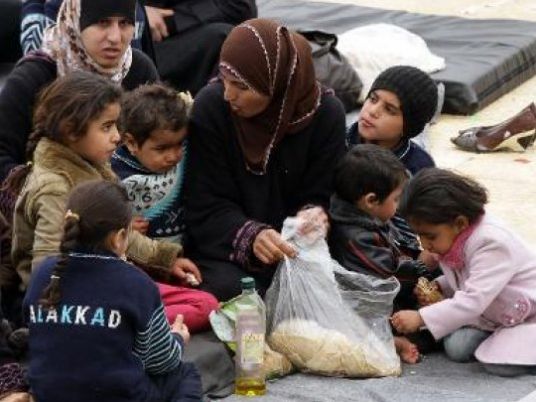
At a shelter in Damascus, the strain of life under a crippling siege not far from the Syrian capital is etched on the gaunt faces of those who have escaped.
Hundreds of families have fled the district of Eastern Ghouta in the past few months, after more than one-and-a-half years of hunger and deprivation.
In the courtyard of the shelter in a multi-story building, 52-year-old Abu Ali lies on a mattress on the ground, his walking stick next to him.
"Every day I would wake up at dawn and go with my daughter to rifle through rubbish bags looking for lettuce leaves or anything to stave off our hunger," he says bitterly.
"When I was working and I could provide for my family, I could call myself a man, but now," he says, his voice trailing off as he wiped tears from his face.
Abu Ali moved around Eastern Ghouta, trying to find somewhere safe for his family.
They fled the town of Mleiha inside Eastern Ghouta to nearby Saqba, before eventually taking advantage of a deal that allowed thousands of people to leave the embattled area altogether.
He evacuated to a shelter managed by the national reconciliation ministry under the supervision of government troops, escaping daily bombardment and fear of starvation.
Thirty-five-year-old Salma, another evacuee at the shelter in Qudsaya northwest of Damascus, sits hugging her daughter.
"We decided to leave, even if it meant risking our lives," she says.
"In any case, our children were dying of fear, hunger and cold."
A mother of two, Salma is from Eastern Ghouta's Hazzeh region, and survived nearly two years of food and medical shortages that have caused the deaths of dozens of people.
"I haven't eaten a tomato, a potato or a lemon for more than a year," she sighs.
Soaring food prices
Salem, from Eastern Ghouta's Deir al-Assafir, is still dressed in rags and reveals teeth that are blackened and riddled with cavities.
He and his family got by on "animal feed and barley" but even those meager supplies came at a high price.
Salem sold his wife's jewellery to be able to afford barley that was only available at the exorbitant price of 1,000 Syrian pounds ($20) a kilogram.
Residents describe other soaring prices for goods that were in ever-shorter supply.
"We used to buy single cigarettes for 175 Syrian pounds (70 cents), while outside the whole box costs 125 Syrian pounds," says 50-year-old Abu al-Nur.
Eggs cost more than four times their usual price, and a kilo of sugar costs 32 times the regular amount, evacuees say.
The displaced are assigned to rooms in a multi-story shelter, each furnished with basic items including black mattresses.
In one room in the shelter, which AFP visited on a trip organized by the national reconciliation ministry, a man with both legs amputated lay on his mattress.
Volunteers at the shelters described numerous ailments among those leaving the besieged region.
"We're seeing diseases that we haven't heard in this country for a long time, like tuberculosis and leprosy," says Abu al-Majd, a volunteer at a center housing 860 people.
Doctors Without Borders warned this month that "the medical situation, and the general living conditions (in Eastern Ghouta), are beyond any red lines."
'I have nothing'
Elsewhere in the shelter, a family sits in the open-air, savoring a simple meal of fava beans.
Next to them is Mustafa, his thin frame visible beneath his robes and evidence of the 40 kilos he lost in less than two years in Eastern Ghouta.
The 76-year-old once ran a chain of butcher shops in Mleiha, but found his strength slipping away.
"I used to be able to carry a sheep weighing 50 kilograms all on my own, but afterwards, I couldn't lift anything," he says.
Much of Eastern Ghouta has been damaged in near-daily bombardment by government forces and fighting between regime troops and rebels.
Residents like Mustafa, who once employed 60 people, have left behind homes and shops that are now vulnerable to looting.
"I was well-off, but now I have nothing. My home and my business were destroyed. Everything I achieved in my life has evaporated."




